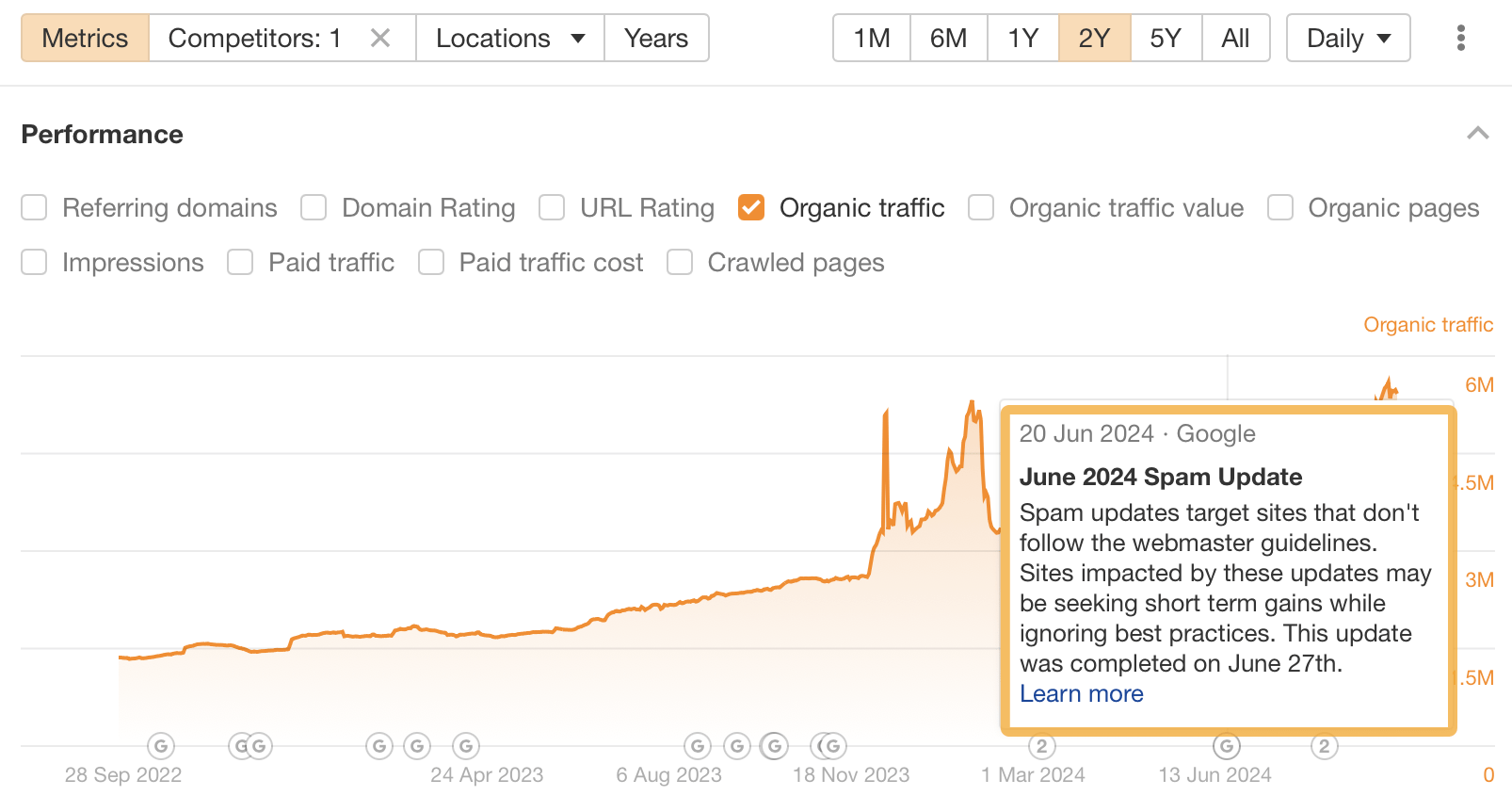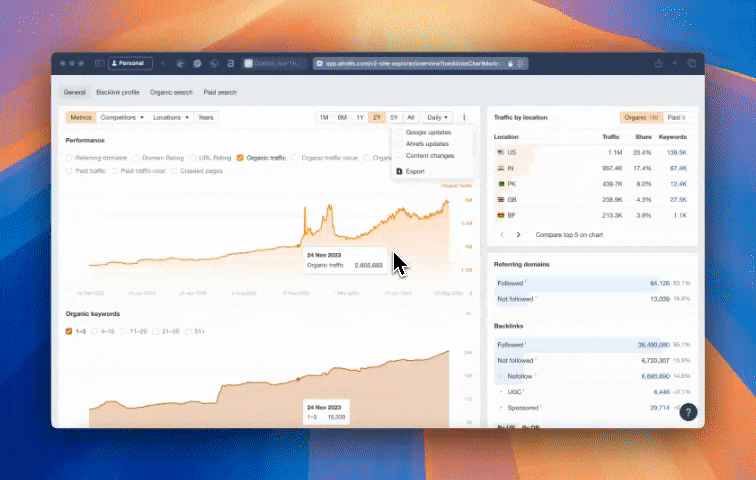Are you frantically Googling “SEO interview questions” because you’ve got an upcoming interview like… tomorrow? If so, don’t panic—I’ve got you covered.
As research for this article, I’ve asked eight top hiring managers to share the #1 SEO interview question they’re asking candidates right now, so you can understand what types of questions hiring managers are asking.
The hiring managers I talked to came from a range of different backgrounds: agency, in-house, and enterprise businesses.
It’s impossible to prepare for every question ahead of the interview, but it’s important to put yourself in their shoes and diligently do your research.
At a minimum, you should consider:
- What’s important to them and their business?
- Why should they hire you?
- Can you demonstrate a thorough understanding of SEO and bring the receipts to prove it?
Ok, that’s enough from me—let’s see what the hiring managers had to say.
This question comes from Sam Page, Director of SEO, Slack:
A competitor has implemented a new SEO strategy. How do you analyze their strategy and when do you consider implementing something similar?
How to answer
Here’s how Sam would answer this question:
I look at how the competitor uses the strategy to grow keywords, traffic, or engagement. If it makes sense and falls within best practices, I would consider implementing something similar (ideally, finding a way to improve upon it).
I analyze the success of their strategy with SEO tools like Screaming Frog, Ahrefs, and Page Speed Insights (I am open to other tool ideas like GTMetrix).
I also want to consider whether the strategy is appropriate for our customer base.
Tip
As Sam mentioned, you can use Ahrefs to help with this.
I’d suggest checking out the Content changes filter in Site Explorer’s Overview to understand whether the content changes you or your competitors have made have had a positive or negative impact. You can use this information to help inform your SEO and content strategy.
This question came from Jimisha Thakrar, Head of Organic Performance at MG OMD:
“How would you handle a situation where someone in leadership wants immediate SEO results?”
How to answer
Jimisha gave an example of how to answer:
SEO is a long-term strategy, but I understand the pressure for quick wins. In these situations, I would focus on setting clear expectations early on within the business by showing realistic timelines for SEO impact and comparing it to other channels like paid search.
It’s also important to realize how key resource for implementation is going to be and that this is also going to have an impact. There are things you can do, such as identify low-hanging fruit that can provide quicker results, such as optimizing underperforming pages that are ranking on page 2 or fixing technical SEO issues that are limiting visibility (resource dependent).
Next, if leadership is eager for quick traffic due to seasonality/campaign deadlines, I would suggest they leverage paid channels for immediate impact while building on the SEO with a hybrid approach, combining short-term paid search with longer-term SEO efforts. This approach could provide the immediate visibility they seek while SEO efforts lay the groundwork for sustainable, organic traffic growth.
Finally, I would communicate the importance of patience and long-term investment in SEO, perhaps showing examples of how it contributes to sustainable traffic and revenue growth over time and work with them to focus on developing a robust SEO strategy that ensures long-term visibility.
Tip
SEO is usually a long-term marketing strategy, as Jimisha says, and you need to communicate this clearly to stakeholders, but there are a few things you can do to accelerate your SEO results.
Check out my article on Quick SEO, for eight ways to accelerate your results from months to days.
The next question comes courtesy of Fabrizio Ballarini, Organic Growth at Wise:
If you could create any page you want on your current website, what would you create?
How to answer
Often, candidates are blocked by resources and buy-in from stakeholders. I want to assess what they would do if given the freedom to execute.
Sidenote.
In my opinion, it sounds like Fabrizio is keen to find independent, creative thinkers with this type of question. This is a good example of where it is useful to have a personal website so you can say, “This is what I would do—and this is what I have done on my website.”
Even if the website is still relatively small, if the quality of the pages you mention is good, it may catch the attention of the hiring manager.
This question came from Itamar Blauer, Senior SEO Director at StudioHawk:
What do you think the most significant Google update has been in the past two years, and why?
How to answer
Itamar said he’s looking for three things when asking this question:
Firstly, I want to understand whether the candidate keeps up to date with the SEO industry and search landscape.
Secondly, I want to see how the candidate can prioritize and be critical.
Lastly, I want to get an insight into how the candidate sees different SEO areas and their significance.
I’d look for answers around the various Helpful Content Updates over the past year or so, as these have been fairly significant. Mentions of broad core algorithm updates are also fine but (generally) not as significant.
Tip
To answer this, you need to make sure you’re very extremely familiar with all the latest Google algorithm updates and be able to critically evaluate their significance.
You can use Ahrefs’ Site Explorer Google updates overlay to see whether updates correlate to traffic increases or decreases for the website you’re analyzing.


Here’s the question Daniel Foley Carter, Director at SEO Stack, likes to ask candidates:
How would you perform SEO testing, and why is it so important?
How to answer
This is how Daniel would like a prospective candidate to answer it:
SEO testing is important within an SEO strategy because there are so many nuances to ranking and ranking factors that we have to find that “happy medium” by testing.
Testing allows us to scratch under the surface of what our pages need to have in respect of content (including information priority, content coverage, depth, and quality of information) alongside traditional things such as tech compliance, internal & external anchors, and more.
Effectively, testing allows us to find out what’s right on a case-by-case basis – as typically, each page on a domain will be aimed at different queries where, ultimately, ranking factors are likely to vary.
Therefore, sequential and persistent testing would allow us to find what works best to establish rank and drive revenue/traffic.
Tip
You can monitor your performance of SEO tests using the Portfolios feature in Ahrefs.


This question comes from Rachel Walton, Head of SEO at Quirky Digital:
How do you prioritize which SEO work should be completed first?
How to answer
Here’s why Rachel likes asking this question, and what she’s looking for in an answer:
I love this question because the candidate will reveal a lot about both their soft skills (time and resource management) and their hard skills (specific SEO red flags) in the answer.
Candidates who interpret this as a question about their soft skills will often talk about prioritizing work that has the highest impact for the lowest resource input, or they might talk about using the first month to complete work that they know is the most important to the client.
The candidates who approach the question with an answer about their hard skills will usually talk through some key issues that they like to ensure are resolved quickly, such as poor information architecture (IA), poor technical setup, and indexing issues.
I’m always impressed with candidates who demonstrate their understanding of what foundations a client needs to perform well – this usually indicates that they have a great combination of both soft and hard skills.
For example, they realize that it’s going to be a lot easier for us to manage cannibalization issues before we move on to producing new content to save ourselves the hassle of needing to amend tons of internal linking later down the line when we cull useless or duplicated content.
This kind of response shows me that the candidate understands SEO concepts, is a forward thinker, and likely has some practical experience of messing it up once or twice and needing to rectify their mistakes — because the best growth often comes from getting it wrong, but learning from it!
Next up, here’s a question from David Schulhof, Director of Digital at PHA Group:
What should be the main priority for brands investing in SEO today, and why?
How to answer
Here’s why David likes this question and how he expects someone to answer it:
I like this broad question because it highlights what area of SEO the person is focused on and how open-minded they are to the broader SEO spectrum.
It usually ignites a good discussion and talking points to explore experience and knowledge further and also leads to lots of follow up questions.
As with any interview question, I want to hear validation for detail behind the answer, why they think it’s a priority, and how that could vary for different clients.
I would usually follow up with specific sectors or types of brands to see if the answer would change.
Our final (and very big) question comes from Philip Gamble, Head of SEO at Zenith:
What do you think the impact of AI Overviews will be on SEO as a channel?
How to answer
Philip provides an example answer below but interestingly suggests that there isn’t a right answer here.
The question is there to test the candidate’s general understanding of SEO and explore their ability to justify their SEO opinions and communicate them succinctly—essential for working agency-side.
At the moment, AI Overviews have not had a significant impact on most of my clients.
Their presence is fairly minimal compared to the early beta, and I see them predominantly on the upper funnel informational terms, mostly longer question queries.
I’ve seen a few useful AI Overviews, for example, when searching for a grammar-related question. Still, in a few cases, they just seem to duplicate information already in featured snippets. I’ve also seen some examples where the generated result wasn’t helpful.
Final thoughts
If you want to ace the interview, you need to get into the brain of the hiring manager. This is often easier said than done. As you can see from this post, every hiring manager is looking for something slightly different. You can only do this by understanding what’s important to them—and by understanding who they’re looking for.
Are you an SEO hiring manager and want to contribute to this article? If so, share your favorite SEO interview questions here or contact me on LinkedIn.













